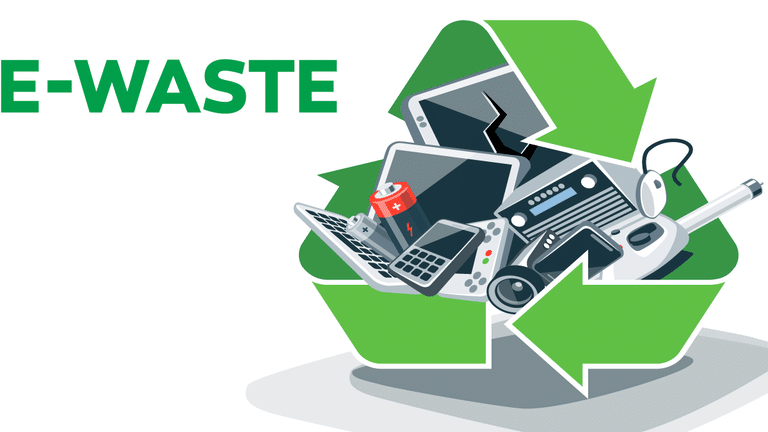E-Waste: What Is It and How Do You Dispose of It?

E-waste, or electronic waste, is a term used to describe any discarded or unwanted electrical or electronic device. It is a growing problem in today’s society as technology advances and new products become available. E-waste is made up of items such as computers, cell phones, televisions, microwaves, and other electronic items.
Given the toxic materials contained in these products, proper disposal of e-waste is incredibly important. Improper disposal of e-waste can lead to the release of hazardous chemicals and other pollutants into the environment, as well as the potential for identity theft:

What Is E-waste?
E-waste, also known as electronic waste, is any discarded electronic device or component that has reached the end of its useful life. Examples of e-waste include computers, televisions, printers, mobile phones, refrigerators, and other electronic and electrical items. E-waste is a growing problem, as more and more electronic devices are being produced and discarded at an increasingly rapid rate.
E-waste poses a number of environmental and health hazards. Many e-waste items contain hazardous materials such as lead, mercury, and cadmium, which can be released into the environment if not properly managed. In addition, e-waste contains valuable resources such as metals and plastics, which can be recovered and reused if handled properly.
The most effective way to manage e-waste is to reduce, reuse, and recycle. Reducing the amount of e-waste produced is one of the best ways to reduce the environmental impact. This can be done by replacing outdated electronic devices with more energy-efficient models, and by repairing and refurbishing existing devices instead of buying new ones. Reusing e-waste involves finding new uses for old electronic devices, such as donating them to charity, selling them, or using them for parts. Recycling e-waste involves breaking down the components and extracting the valuable resources from them.
E-waste is a growing problem, but with the right approach it can be managed effectively. By reducing, reusing, and recycling e-waste, we can help reduce the environmental impacts associated with it and make sure that valuable resources are not wasted.
How Is E-waste Properly Disposed of
E-waste, or electronic waste, is a growing problem in today’s society. With our ever-increasing dependence on technology, more and more electronic devices are being discarded, resulting in a greater need to properly dispose of these items. Fortunately, there are a number of ways to properly dispose of e-waste.
The first step in properly disposing of e-waste is to identify which items are considered e-waste. Common examples of e-waste include computers, televisions, printers, and other electronic equipment. Once you’ve identified the items, it’s important to find out what the local laws and regulations are for disposing of e-waste. Depending on your location, there may be specific requirements for proper disposal, so it’s important to do your research.
If the local laws allow, one of the best ways to dispose of e-waste is to donate it to a charity or nonprofit organization. This way, the equipment can be reused rather than thrown away. Many charities and organizations accept donations of used electronic equipment, so be sure to check with your local charity or organization to see if they accept donations.
If donating is not an option, there are a number of other ways to properly dispose of e-waste. Many local governments offer collection programs for e-waste, so be sure to check with your local government to see if they offer such a program. If they do, they will typically provide a list of items that can be recycled and a list of items that need to be disposed of properly.
Another option is to take the e-waste to a specialized recycling center or e-waste disposal facility. These centers are equipped to properly handle and dispose of e-waste in an environmentally friendly way. Again, be sure to check with your local government to see if they offer such a service.
Finally, if you are unable to donate or take your e-waste to a recycling center, you can contact your local waste management company to see if they offer e-waste pickup services. Many waste management companies offer these services, so be sure to check with your local company to see if they offer this option.
Conclusion
E-waste is a growing problem, but by following the steps outlined above, you can help ensure that your e-waste is disposed of properly. By donating, recycling, or utilizing a waste management company, you can help to reduce the amount of e-waste in our environment.
If you have more questions about e-waste disposal, you can contact a trusted Atlanta recycling center.
Atlanta Green Recycling is a recycling center in Atlanta that offers cost-effective and sustainable solutions. Allow us to dispose of and recycle your electronics from your home or work. Contact us today!